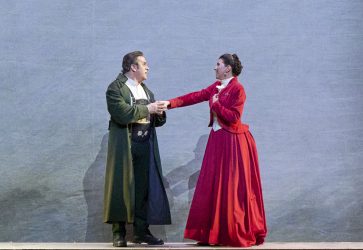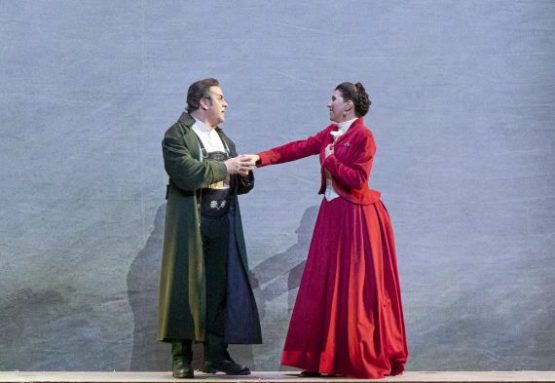 Austria Rossini, Guillaume Tell (William Tell): Soloists, Chorus and Orchestra of the Vienna State Opera / Bertrand de Billy (conductor). Transmitted live (directed by Dominic Zepczynski) from the Vienna State Opera, 16.3.2024. (JPr)
Austria Rossini, Guillaume Tell (William Tell): Soloists, Chorus and Orchestra of the Vienna State Opera / Bertrand de Billy (conductor). Transmitted live (directed by Dominic Zepczynski) from the Vienna State Opera, 16.3.2024. (JPr)

Production:
Director – Sir David Pountney
Stage and Costumes – Richard Hudson
Lighting design – Robert Bryan
Choreography – Renato Zanella
Chorus master – Martin Schebesta
Cast included:
Guillaume Tell – Roberto Frontali
Arnold – John Osborn
Jemmy – Maria Nazarova
Gesler – Jean Teitgen
Ruodi – Iván Ayon Rivas
Mathilde – Lisette Oropesa
Walter Furst – Stephano Park
Melcthal – Evgeny Solodovnikov
Rodolphe – Carlos Osuna
Leuthold – Nikita Ivasechko
Hedwige – Monika Bohinec
In July 2011 (where have those 13 years gone?) when Antonio Pappano conducted the orchestra and chorus of the Academy of Santa Cecilia of Rome in a concert performance of Rossini’s Guillaume Tell I wrote how it ‘was undoubtedly the best Prom I have been to … since the last time I wrote I had been to a Prom that was the best one I could remember!’ I first saw Guillaume Tell at Covent Garden in 1992 and again when it arrived there in 2015 to a chorus of boos when Italian director Damiano Michieletto’s new staging included a controversial interlude (which usually involves some dancing) as a depiction of sexual violence towards women by soldiers during wartime.
So watching this live broadcast from Vienna was the fourth time I had seen Rossini’s famous 1829 opera which tells the story of the eponymous Swiss patriot who is made to shoot an arrow at an apple on top of his son’s head and save him from the sadistic governor, Gesler, who is in charge of Switzerland. For those of a certain age it is also well-known for its overture part of which was used as a galloping horse theme in the Lone Ranger TV series (and heard in the 1956 movie with the same cast I saw only a few days before this). The opera is based on an 1804 play by Friedrich Schiller about the Swiss hero who is their version of our Robin Hood. Tell is also a legendary archer and his defiance inspires a successful rebellion against Austrian rule. Whether he and the evil Gessler, ever existed – like Robin Hood and the Sheriff of Nottingham – is debatable. It is interesting that this opera – which ends with a paean for freedom from an oppressors’ yolk and concludes with the line ‘Liberté, redescends des cieux!’ (‘Liberty, descend again from heaven!’) – was first put on in Paris in 1829, and within 11 months the last Bourbon King of France, Charles X (to whom Guillaume Tell was dedicated) had been removed from the throne by the July revolution of 1830!
This (non-controversial) Sir David Pountney production is now over a quarter of a century old replacing a 1905 one which followed other stagings in 1869 and 1884. Having written thirty-nine operas (including the ubiquitous Il barbiere di Siviglia when he was only 24) Rossini took early retirement at 37 after the success of Guillaume Tell for reasons still unclear today. Rossini was a contemporary of Meyerbeer and the demands of Guillaume Tell with all the characters, choruses and ballet interludes (now mostly cut) make it one of the grandest of the ‘grand operas’ of its age and laid the foundations for everything the mature Wagner would compose. Verdi was also clearly influenced by Rossini and he purloined Arnold’s Act IV vengeance aria (‘Amis, amis, secondez ma vengeance’) as the model for Manrico’s ‘Di quella pira’ in Il trovatore.
If beautiful Swiss mountain vistas, cowbells, lederhosen, dirndls and felt caps with feathers is what you expect to see in any Guillaume Tell, well, Pountney brings to his production some of that in the rural Swiss population he shows us. The colours of Richard Hudson’s costumes are rather muted and his sets are rather grey with an alpine landscape often seen in the background and trundled in and out (with lots of visible handling by stagehands) are smaller represents of the mountains on low platforms which match some small-scale models of Swiss chalets, farmhouses and barns we see around the stage from time to time. Everything is dominated by two huge – and I mean huge – articulated puppets; one representing the elder Melcthal, the leader of the community, and the other Hedwige, Tell’s wife, with both singers sitting high up on their respective puppets. (After Melcthal is killed the parts of his puppet remain scattered on the floor of the stage.)
Perhaps the immense size is to emphasise the importance of Melcthal and Hedwig to the developing story. Melcthal son, Arnold, a Swiss patriot, is illicitly in love with Mathilde, an Austrian princess and a supposed enemy. When a shepherd Leuthold kills one of Gesler’s soldiers to top him defiling his daughter, a fisherman Ruodi – who we first hear singing in his boat high above the stage – is too frightened to row Leuthold to the opposite shore to make his escape it is Tell who takes him. When Melcthal refuses to tell (!) Gesler’s henchman Rudolphe who it was rowing the boat he is taken prisoner and subsequently executed, triggering Arnold setting out to revenge him. Eventually Tell is recognised, arrested and must shoot the apple off his son Jemmy’s head in order to save their lives. When it is revealed Tell had intended a second arrow for Gesler he is seized along with his son and both will now be executed. Matilde arrives and takes Jemmy under her protection. Tell is to row onto the lake with Rudolphe and is to be despatched by being thrown into it. Tell survives to kill Gesler, Jemmy is reunited with his mother Hedwige, as is Arnold with Mathilde, and everyone sings of how magnificent nature is and celebrates their freedom once again.
Obviously, this is just the CliffsNotes of what you see leisurely unfold over the four acts of Guillaume Tell. Thanks to Pountney the characters we see are generally believable and more multi-dimensional than they can sometimes appear to be but they do tend to sing facing out to the audience more often than not. I thought Roberto Frontali lacked some charisma as a rather dour William Tell and didn’t really stand out from the crowd as a potential leader of any uprising. Nevertheless, Frontali’s Tell was obviously a caring father and very protective of his son, while the fresh-voiced Maria Nazarova was remarkable as the young Jemmy. Sadly, the shooting of the apple is risibly staged with the arrow passed painfully slowly through many hands before it is pierced into the apple!

John Osborn was a late substitute for Juan Diego Flórez as Arnold, and I also saw and heard him in this role in 2011 and 2015. Together with Lisette Oropesa’s Mathilde, they have the best show-stopping moments, ‘Sombre forêt’ (‘Gloomy forest’) for her in Act II and for him that challenging final act cabaletta following his aria ‘Asile héréditaire’ (‘Home of my forefathers’) with all the high Cs and C-sharps. (I understand there are 17 of the former and 2 of the latter in this role.) As I wrote before. John Osborn is a genuine bel canto tenor, at seeming ease with the fearsomely high-lying part. Lisette Oropesa sang Mathilde and negotiated all the coloratura demanded from her assuredly during some impassioned and expressive singing. Carlos Osuna was rather a one-dimensional baddie – more Rossini’s fault than Osuna’s – but he was very convincing, nonetheless. Evgeny Solodovnikov was a booming Melcthal more vital than some perhaps are, and the mellow mezzo-soprano Monika Bohinec was an earnest, compassionate Hedwige. The smaller roles of Leuthold, Ruodi and Walter Furst were characterfully sung and well-acted by Nikita Ivasechko, (a particularly sweet-toned) Iván Ayon Rivas and Stephano Park respectively. The chorus (rehearsed by Martin Schebesta) was magnificent throughout, however there was some rather eccentric choreography for the ballets from Renato Zanella.
An elegiac – and virtuosically played – cello solo ushered in Rossini’s evocation of a pastoral Swiss community with the following ‘storm’ and ‘call to the dairy cows’ before the very well-known ‘gallop’. Betrand de Billy brought out all that was pastoral, tender, joyous, solemn or dramatic in the music – chockful of solos, duos, trios, ensemble pieces and choruses — and superbly integrated it all into a very convincing account of Rossini’s colourful score. The playing by the members of the Vienna Philharmonic – seemingly filling the pit to overflowing – was up to their usual exemplary standard.
Jim Pritchard
